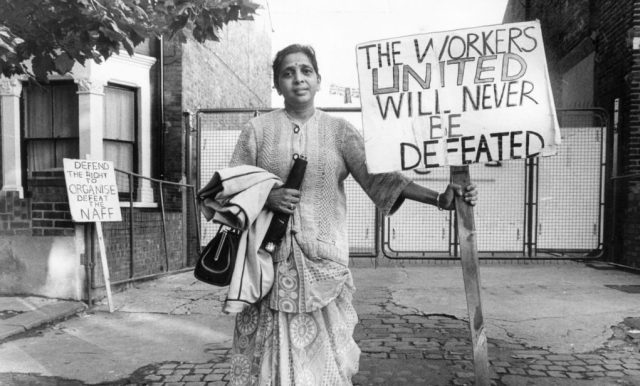The treasurer of the Grunwick strike committee, Jayaben Desai, in 1977. (Photo by Graham Wood/Evening Standard/Getty Images)

When the broadcaster Samira Ahmed won the sex discrimination equal pay claim that she’d brought against the BBC, it might have looked like yet another highly paid privileged woman whinging about a salary that would seem enormous to most.
But this is not a ruling that will only apply to privileged media professionals. Ahmed’s victory will have positive ramifications across the low-paid sector, and for the most marginalised employees. Thanks to Ahmed’s bravery and tenacity, her insistence in fighting this case alongside her union, and the way she continually made links between her one-woman struggle and the most iconic of working-class and BAME women’s battles for equality and dignity in the workplace, this case will go down in history as a game-changer.
Ahmed claimed the BBC had underpaid her by a whopping £700,000 over six years for hosting the television show Newswatch when compared with the amount Jeremy Vine was paid for hosting a similar show, Points of View. The 600% difference in pay, claimed Ahmed, was purely down to sex discrimination.
Fifty years after the introduction of the Equal Pay Act, one third of all employees are still not aware that it is illegal for men to be paid more than women for doing the same or similar job, according to the Fawcett Society. I bet, thanks to the high-profile nature of Ahmed’s case, that many more women now know what they are entitled to.
One of the very few high-profile British-Asian women at the BBC, Ahmed is both a feminist icon and a role model for people of colour in the media and beyond. She is also a born fighter. When she was just ten years old in 1978, Ahmed wrote to Newsround to tell her story of playground racism at school, which was subsequently read out on air.
Her win is no ‘glass ceiling’ moment. Whenever a battle about equal pay is played out in public, the focus tends to be on barriers in the careers of high-achieving women and rarely about the women at the bottom. Ahmed is certainly not representative of zero-hour workers or low-paid part-timers, but her case will help them, nonetheless. Most media coverage after the initial announcement edited out Ahmed thanking the National Union of Journalists and its pivotal role in the action, and any mention of the 1976-8 Grunwick strike, except Channel 4 news and ITV news.
There is a good reason that Ahmed thanked the women that led the Grunwick dispute. Those women, most of them Indian women from East Africa, called the strike at a film-processing factory over low pay and horrendous working conditions. In the 1970s, union officials were all white men who, in the main, did not give two hoots about female workers and their issues. The Grunwick women forced them to do so.
Yet counsel for the BBC argued that while Vine was like a “concert pianist in a concert hall”, Ahmed was more like “someone playing piano to a ballet class of 10 children”. On social media, a few blokes annoyed at any woman speaking out (and a non-white one to boot) tweeted sarcastic, derogatory remarks about how Ahmed was unknown compared with Vine, and how Vine is a ‘star’ and she is not. These remarks are born out of blatant sexism. To belittle a talented and experienced presenter like Ahmed is appalling.
Ahmed took the case against the BBC with the support of the NUJ, which is one of the many reasons why her win will have ramifications way beyond benefiting the elite. As well as acting on behalf of Ahmed, the NUJ also raised grievances on behalf of dozens of other women at the BBC.
I have heard more than one journalist covering this latest case hint that they may instigate a freedom of information request to reveal just how much the BBC spent on legal fees on this case alone. Ahmed did all she could to reach an agreement with the BBC over a two-year period before the tribunal.
Most of the newspapers that covered the outcome of the case chose not to use a photograph of Ahmed and none ran a profile, despite that being standard with such a ground-breaking story. Only a video report by ITN’s Juliet Bremner used footage of Ahmed winning Celebrity Mastermind, and began the report with Ahmed thanking the Ford Dagenham sewing machine strikers — an inspiring story of working-class resistance that was made into a popular feature film — and the Grunwick women.
As a feminist and journalist I was obviously interested in the outcome of this case. On day one of the tribunal last November I joined other supporters, women and men, in walking with Ahmed from the Tube station to the employment tribunal offices. One of those supporters was Ahmed’s colleague Naga Munchetty, the BBC presenter who received widespread support after a single viewer complaint against her was partly upheld (and later dismissed). Munchetty was accused of breaching BBC guidelines over comments she made about a tweet from Donald Trump about four female politicians of colour.
This case is not only about sexism. By linking her struggle to that of low-income working-class women in the 1970s, and highlighting the intersection of sex and ethnicity, and how that impacts on minority ethnic women, Ahmed has shown herself to be a force to be reckoned with, and a role model of all of those women that find themselves pushed out on the margins. Her case is as much about inspiring marginalised and oppressed people to fight for dignity and respect as it is for equal pay at the BBC.










Join the discussion
Join like minded readers that support our journalism by becoming a paid subscriber
To join the discussion in the comments, become a paid subscriber.
Join like minded readers that support our journalism, read unlimited articles and enjoy other subscriber-only benefits.
Subscribe